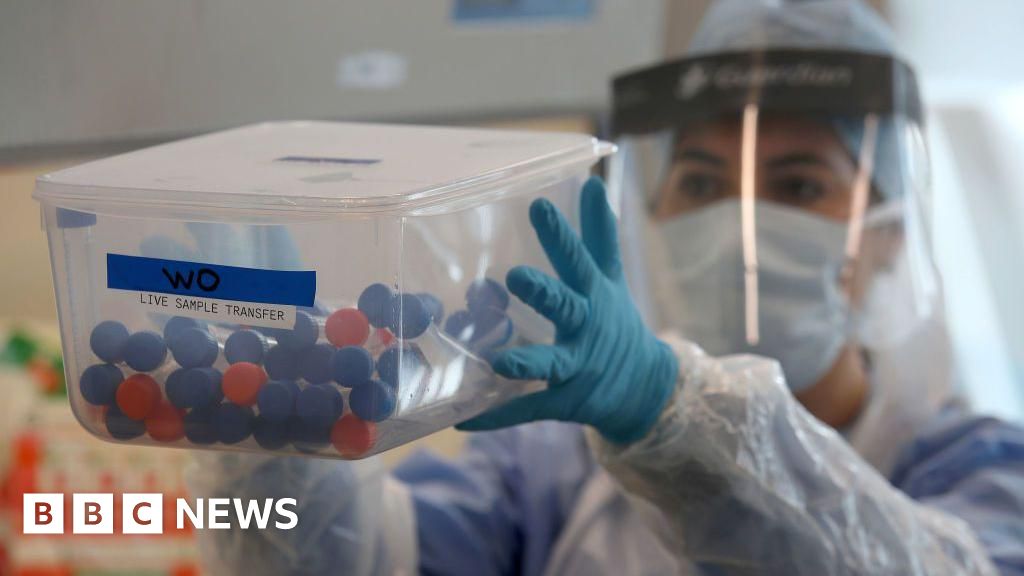ARTICLE AD BOX
By Branwen Jeffreys
Education Editor
Year 6 pupils in Sheffield have been trying to catch up after the disruption
The "devastating" impact of England's school closures during the pandemic is leading to greater inequality, MPs say.
A report by the Education Select Committee found Yorkshire and the Humber, and the North East are the worst-affected areas.
It warns the flagship National Tutoring Programme is falling far short of its targets this year.
The government said it aimed to ensure as many children as possible received high-quality catch-up tutoring.
The committee gathered evidence about how education in England is recovering after two years of disruption.
The report calls for the government to "refocus" its efforts on a "fragmented and bureaucratic" catch-up programme.
Primary maths is one of the subjects where there are shocking regional differences: the average learning loss was 0.5 months in the South West, 0.9 months in London, four months in the North East and 5.3 months in Yorkshire and the Humber.
At Greenhill Primary School in Sheffield, it has been one of the subjects where pupils have been offered extra teaching to recover lost ground.
Year 6 teacher Toni Whitehouse said there had been a "massive impact" from the classroom closure, and not just on learning.
"We found children couldn't sit still, hold a discussion, collaborate with other children," she said.
As well as covering new topics, teachers have had to reinstil some of the basics.
"Coming back from Covid, I've got children who can't use capital letters, full stops, the kind of skills we taught them when they were four or five."
Nicola said she lost confidence because of the disruption to classes
Annabel, one of the Year 6 pupils, said booster classes with her teachers have really helped after the disruption.
"I think it's helped with my arithmetic and reasoning. We didn't get to do much in lockdown. I lost quite a lot of confidence."
Nicola, also in Year 6, said despite extra help she is worried about going to secondary school.
"My confidence with learning got a bit messed up - with a year-and-a-half of learning partly at home with your family around you."
Long-term damage
The risk of failing to make up for the learning loss from the pandemic is rated as "critical or very likely" by the Department for Education itself in its annual report.
Robert Halfon, chairman of the Education Select Committee, thinks the damage could be long term
"This is incredibly serious, children have lost months of learning, disadvantaged children are between five to eight months behind in maths.
"We are damaging their life chances if we don't get this catch-up programme right."
He is also worried that if the almost £5bn committed so far isn't well spent, it could be hard to persuade the Treasury to give more funding to education.
Toni Whitehouse said disruption had had a massive impact
Greenhill is part of a group of nine primary schools spread across Sheffield in very different parts of the city.
Chief executive Nicola Shipman says some schools have seen children more affected by the pandemic than others.
Confusing funding
They tried using one part of the National Tutoring Programme, which is the main part of the government's catch-up programme, to get academic mentors for pupils. However, they found it wasn't easy to recruit enough good people.
This year instead, like many schools, they have used their own staff to run extra sessions with some extra government funding, rather than using tutoring agencies through the national scheme.
Ms Shipman said: "There needs to be a rethink, about how that money can be better spent by those of us who know our children better."
Schools can bid for funding from the National Tutoring Programme to organise extra tutoring themselves for disadvantaged pupils, or seek to be matched with tutoring agencies and academic mentors for pupils. This is via the private company Randstad, which won the contract.
However, MPs say it has only reached 52,000 courses so far - just 10% of this year's target for tutoring courses.
They criticised the lack of transparency around the contract, and a decision to relax a target to reach mainly poorer pupils with tutoring.
Unless performance improves, the report calls for the contract with Randstad to be scrapped.
It adds the current "spaghetti junction" of confusing funding should be replaced by giving money directly to the schools and areas that need it most.
So far almost £5bn has been committed to education recovery in England.
A Department for Education spokesperson said: "Tutoring plays an integral role in supporting pupils to catch up on any lost learning, and delivery is on track to meet the ambitious target of teaching two million courses this academic year.
"We continue to work with Randstad to ensure as many children from all backgrounds - in particular those from disadvantaged backgrounds - across the country can benefit from high-quality tutoring and catch up on lost learning."

 3 years ago
62
3 years ago
62








 English (US) ·
English (US) ·